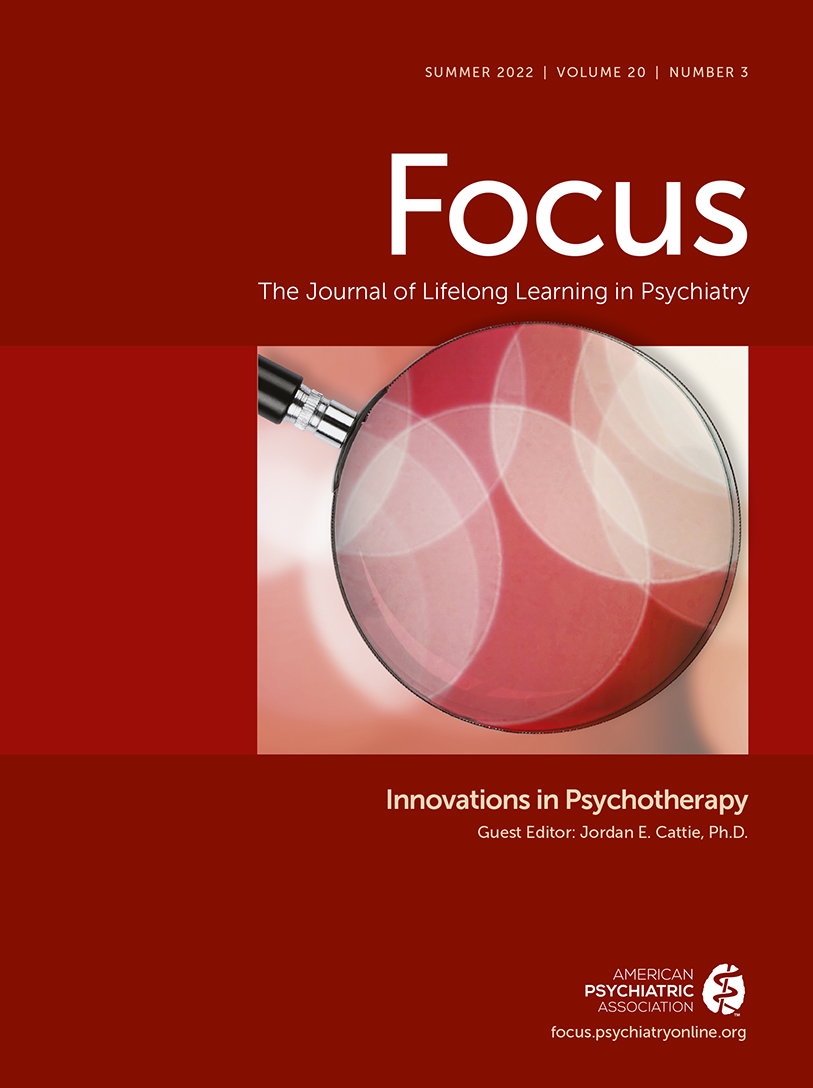Innovations in Psychotherapy
This section contains a compilation of recent publications that have shaped the thinking in the field as well as classic works that remain important to the subject reviewed in this issue. This bibliography has been compiled by experts in the field. Articles from the bibliography that are reprinted in this issue are in bold type.
: Radical healing in psychotherapy: addressing the wounds of racism-related stress and trauma. Psychotherapy (Chic) 2022 (Epub ahead of print, Mar 10, 2022). doi:
: Fundamentals of assessment in clinical health psychology; in Biopsychosocial Assessment in Clinical Health Psychology. Edited by Andrasik F, Goodie JL, Peterson AL. New York, Guilford Press, 2015, pp 8–20Google Scholar
: Research in counselling and psychotherapy post‐COVID‐19. Couns Psychother Res 2021; 21:3–7Crossref, Google Scholar
: Anti-Black racism and behavioral medicine: confronting the past to envision the future. Transl Behav Med 2022; 12:ibab090Crossref, Google Scholar
: How to provide anti-racist mental health care. Lancet Psychiatry 2020; 7:929–931Crossref, Google Scholar
: Psychotherapy as a healing practice, scientific endeavor, and social justice action. Psychotherapy (Chic) 2012; 49:473–474Crossref, Google Scholar
: Evidence-based behavioral medicine: what is it and how do we achieve it? Ann Behav Med 2003; 26:161–171Crossref, Google Scholar
: Mindfulness and acceptance-based interventions with Black Americans: a meta-analysis of intervention efficacy for depressive symptoms. J Consult Clin Psychol 2022; 90:123–136Crossref, Google Scholar
: Behavior matters. Am J Prev Med 2011; 40:e15–e30Crossref, Google Scholar
: Toward a psychological framework of radical healing in communities of color. Couns Psychol 2020; 48:14–46Crossref, Google Scholar
: Behavioral medicine interventions for adult primary care settings: a review. Fam Syst Health 2018; 36:368–399Crossref, Google Scholar
: A systematic review of the use of Acceptance and Commitment Therapy (ACT) in chronic disease and long-term conditions. Clin Psychol Rev 2016; 46:46–58Crossref, Google Scholar
: The effectiveness of crisis line services: a systematic review. Front Public Health 2020; 7:399Crossref, Google Scholar
: Annual research review: expanding mental health services through novel models of intervention delivery. J Child Psychol Psychiatry 2019; 60:455–472Crossref, Google Scholar
: Design and development of a digital program for training non-specialist health workers to deliver an evidence-based psychological treatment for depression in primary care in India. J Technol Behav Sci 2020; 5:402–415Crossref, Google Scholar
: The role of communities in mental health care in low- and middle-income countries: a meta-review of components and competencies. Int J Environ Res Public Health 2018; 15:1279Crossref, Google Scholar
: Therapist competence in global mental health: development of the Enhancing Assessment of Common Therapeutic Factors (ENACT) rating scale. Behav Res Ther 2015; 69:11–21Crossref, Google Scholar
: Pathways to mental health services for young people: a systematic review. Soc Psychiatry Psychiatr Epidemiol 2018; 53:1005–1038Crossref, Google Scholar
, : Implementing cognitive behavioral therapy in specialty medical settings. Cogn Behav Pract 2014; 24:367–371Crossref, Google Scholar
: Healing interpersonal and racial trauma: integrating racial socialization into trauma-focused cognitive behavioral therapy for African American youth. Child Maltreat 2021; 26:17–27Crossref, Google Scholar
Miller WR, Rollnick S (eds): Motivational Interviewing: Helping People Change, 3rd ed. New York, Guilford Press, 2012Google Scholar
: How mental health care should change as a consequence of the COVID-19 pandemic. Lancet Psychiatry 2020; 7:813–824Crossref, Google Scholar
National Guidelines for Behavioral Health Crisis Care—A Best Practice Toolkit. Rockville, MD, Substance Abuse and Mental Health Services Administration, 2020. https://www.samhsa.gov/sites/default/files/national-guidelines-for-behavioral-health-crisis-care-02242020.pdfGoogle Scholar
: Scale up task-sharing of psychological therapies. Lancet 2022; 399:343–345Crossref, Google Scholar
: IHI framework for improving joy in work. IHI White Paper. Cambridge, MA, Institute for Healthcare Improvement, 2017. www.ihi.org/resources/Pages/IHIWhitePapers/Framework-Improving-Joy-in-Work.aspxGoogle Scholar
: Therapeutic interventions in in‐person and remote psychotherapy: survey with psychotherapists and patients experiencing in‐person and remote psychotherapy during COVID‐19. Clin Psychol Psychother 2021; 28:988–1000Crossref, Google Scholar
: Population-based approaches to mental health: history, strategies, and evidence. Annu Rev Public Health 2020; 41:201–221Crossref, Google Scholar
: Innovative models in mental health delivery systems: task sharing care with non-specialist providers to close the mental health treatment gap. Curr Psychiatry Rep 2019; 21:44Crossref, Google Scholar
: Teaching the fundamentals of remote psychotherapy to psychiatry residents in the COVID-19 pandemic. Acad Psychiatry 2021; 45:629–635Crossref, Google Scholar
, : Behavioral medicine in the COVID-19 era: dawn of the golden age. Ann Behav Med 2020; 54:541–543Crossref, Google Scholar
: Coping With Chronic Illness: A Cognitive-Behavioral Approach For Adherence and Depression. New York, Oxford University Press, 2007Google Scholar
: Psychological treatments for the world: lessons from low- and middle-income countries. Annu Rev Clin Psychol 2017; 13:149–181Crossref, Google Scholar
: Implementation and effectiveness of nonspecialist-delivered interventions for perinatal mental health in high-income countries: a systematic review and meta-analysis. JAMA Psychiatry 2021; 78:498–509Crossref, Google Scholar
: Racial microaggressions in everyday life: implications for clinical practice. Am Psychol 2007; 62:271–286Crossref, Google Scholar



